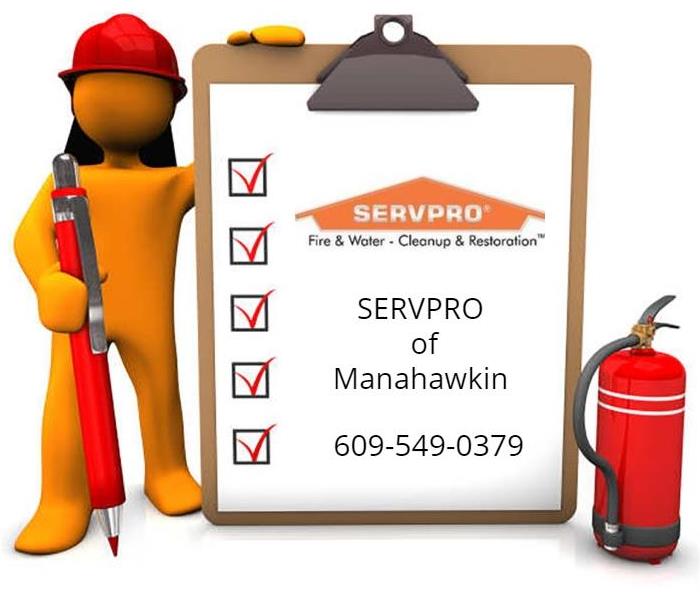Follow Our Safety Do's and Don'ts
7/19/2016 (Permalink)
Be sure all units have working smoke detectors.
Smoke detectors are required by law in all dwelling units used for sleeping. They must be mounted on ceilings or top of the walls and centrally located in the corridor or area leading to each sleeping space. It is recommended that batteries be replaced on a regular basis. A good time to replace batteries is during fall and spring time changes.
Be sure all units have working carbon monoxide (CO) detectors.
Carbon monoxide (CO) detectors are required by law in all dwelling units used for sleeping. They must be mounted in accordance with manufacturer's recommendations. Detectors will chirp if batteries are weak and need replacing. It is recommended that batteries be replaced on a regular basis. A good time to replace batteries is during fall and spring time changes.
Always address the smell of gas.
Gaseous odors indicate a possible natural gas leak. If you smell gas, contact PG&E immediately at 1-800-PGE-5000.
Do not allow children to play near radiators or heaters.
To avoid risk injuries & fires, children should not play near or drop things into radiators, heaters or grates- particularly those heaters recessed into walls and floors.
Use flashlights instead of oil lamps or candles.
Flashlights are helpful in emergencies and safer than oil lamps and candles. Candles and lamps used at other times should be of the low-flame variety, kept away from combustibles and never left unattended.
Keep hallways, stairs and exits clear of bikes, recycling, debris and other trip hazards
Buildings that are not kept in a clean and orderly condition are much more likely to have multiple safety & fire hazards.
Do not overload electrical outlets.
Overloaded electrical outlets are a common fire hazard. Too many devices plugged into one outlet may cause overloading.
Always unseal windows after painting.
New paint can improve a room's appearance, but a sealed window will create a egress hazard in the event of an emergency.
Prepare emergency plans for both fire evacuations & earthquakes.
Map out alternative egress in the event exits are impassable during a fire evacuation. Reduce injuries during earthquakes by not locating mirrors, shelves, bookcases or top-heavy furniture over or near beds. Contact the Berkeley Office of Emergency Services at 981-5605 for more preparation & planning information.
Never disable smoke detectors.
The Berkeley Fire Code requires smoke detectors be operable. It is illegal to disable, disarm, or remove smoke detectors.
Don’t smoke in bed.
It is preferable to smoke outdoors. If smoking is permitted in your building, use adequate and heavy ashtrays, and never smoke in bed. Extinguish and properly discard all smoking material.
Don’t place items against electrical breakers, over heaters or near furnaces.
Many fires start because of combustible materials placed on top of heaters. Stay mindful of breakers and heaters that are recessed into walls and floors and never place anything over or against them.
Don’t use furnace or water heater closets for storage.
Storing items near heat producing devices can cause fires. Nothing should be stored in heater closets.
Don’t use propane or flaming devices indoors.
Propane stoves, torches, charcoal grills and other apparatus must not be used in residential spaces.
Don’t replace 15-amp fuses with higher rated fuses.
Replacing 15amps with higher rated fuses will not provide more power. This will, however, cause electrical short-circuiting and potential fire hazard.
Do not use heat lamps.
Avoid using heat lamps. Because of their extreme temperatures, heat and Torchiere lamps pose a serious fire hazard and are not recommended in residential spaces.
Space heater safety.
It is best to avoid using space heaters. But, if they are used, they must be at least 3 feet away from combustibles, unplug when not in use, never used with an extension cord, and should not be used in a bathroom. “Tip switches” that automatically turn off if the heater tips over are helpful.
Do not run extension or appliance cords under rugs or carpets.
Extension cords may develop wear over time. A worn or frayed extension cord may present a fire hazard.
Don’t clog plumbing.
Sinks, tubs & toilets must drain & operate completely to maintain health & safety. Dispose of waste materials in appropriate receptacles. And don’t flush highly absorbent material down toilets.
Have a designated emergency meeting place
Know what you will do in an emergency, have a designated meeting place for everyone in your household.
In The Event Of Fire Evacuation:
- Never ignore fire or smoke alarms.
- Leave the building immediately — do not stop to collect belongings.
- Do not use elevators. They may lead to the source of the fire.
- Check door handles by touching lightly with the back of your hand. If they are hot, do not open them & find another way out.
- When leaving, close doors behind you and pull any fire alarms you may pass.
- Stay low — beneath the smoke where the air is clearer and safer to breathe.
- When you are safe outside, get to phone and call 9-1-1.
- If your clothes catch fire, Stop, Drop and Roll to put them out.
- Cool burns quickly with water — get medical attention immediately.





 24/7 Emergency Service
24/7 Emergency Service
